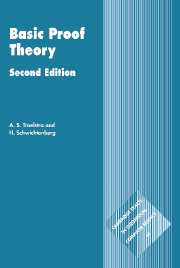Book contents
- Frontmatter
- Contents
- Preface
- 1 Introduction
- 2 N-systems and H-systems
- 3 Gentzen systems
- 4 Cut elimination with applications
- 5 Bounds and permutations
- 6 Normalization for natural deduction
- 7 Resolution
- 8 Categorical logic
- 9 Modal and linear logic
- 10 Proof theory of arithmetic
- 11 Second-order logic
- Solutions to selected exercises
- Bibliography
- Symbols and notations
- Index
Preface
Published online by Cambridge University Press: 05 June 2012
- Frontmatter
- Contents
- Preface
- 1 Introduction
- 2 N-systems and H-systems
- 3 Gentzen systems
- 4 Cut elimination with applications
- 5 Bounds and permutations
- 6 Normalization for natural deduction
- 7 Resolution
- 8 Categorical logic
- 9 Modal and linear logic
- 10 Proof theory of arithmetic
- 11 Second-order logic
- Solutions to selected exercises
- Bibliography
- Symbols and notations
- Index
Summary
Preface to the first edition
The discovery of the set-theoretic paradoxes around the turn of the century, and the resulting uncertainties and doubts concerning the use of high-level abstractions among mathematicians, led D. Hilbert to the formulation of his programme: to prove the consistency of axiomatizations of the essential parts of mathematics by methods which might be considered as evident and reliable because of their elementary combinatorial (“finitistic”) character.
Although, by Gödel's incompleteness results, Hilbert's programme could not be carried out as originally envisaged, for a long time variations of Hilbert's programme have been the driving force behind the development of proof theory. Since the programme called for a complete formalization of the relevant parts of mathematics, including the logical steps in mathematical arguments, interest in proofs as combinatorial structures in their own right was awakened. This is the subject of structural proof theory; its true beginnings may be dated from the publication of the landmark-paper Gentzen [1935].
Nowadays there are more reasons, besides Hilbert's programme, for studying structural proof theory. For example, automated theorem proving implies an interest in proofs as combinatorial structures; and in logic programming, formal deductions are used in computing.
There are several monographs on proof theory (Schütte [1960,1977], Takeuti [1987], Pohlers [1989]) inspired by Hilbert's programme and the questions this engendered, such as “measuring” the strength of subsystems of analysis in terms of provable instances of transfinite induction for definable wellorderings (more precisely, ordinal notations).
- Type
- Chapter
- Information
- Basic Proof Theory , pp. ix - xiiPublisher: Cambridge University PressPrint publication year: 2000



